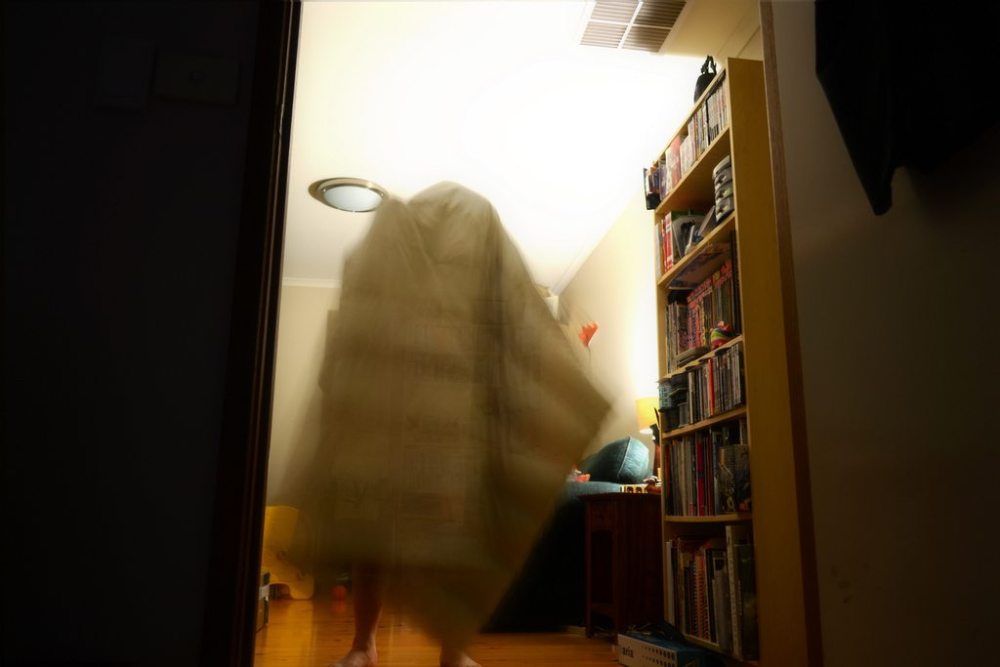
“Autism spectrum” is a phrase I’ve heard countless times over the past decade or so. I first heard the term when my oldest and only son’s preschool teacher started confirming the feelings we had at the time. Something about this boy was not quite normal. After his diagnosis and our self-education on parenting a child with an Autism Spectrum Disorder, it’s a phrase we’ve bandied about in conversation time and again.
So, when my wife casually mentioned a book she had read about people on the “Autism spectrum,” it shouldn’t have made a blip on my internal radar, which at the time was set somewhere between “listen to your wife, nod, and rephrase the last thing she says so she thinks you’re paying attention,” “get breakfasts made,” and “what do I have coming up today?” For some reason — maybe it was because Halloween is coming up, maybe it was because Sam Smith’s theme for the next Bond film had just been released, maybe it was because I was only sort of paying attention — what I heard my wife say was “Autism specter.”
Not a big deal. Misunderstandings and loose associations happen all the time, even when we are paying attention and not trying to butter the bread, pour the juice, and keep the eggs from burning all at the same time. But, rather than dump with the rest of the mental garbage, something about that phrase stuck with me. I hadn’t thought about it in those terms before, but parenting a child “on the spectrum” has been like living with a ghost. Not just one ghost, but — as Ebeneezer Scrooge found out — a multitude of ghosts, each with its own place in time.
The Warning Signs
It starts with a disquiet. Nothing more than a feeling in your gut. You try to pass it off. “There’s more of gravy than of grave about you,” Scrooge said. You convince yourself that everything’s fine. Each child develops at his or her own pace. Nothing to be alarmed about. What do you know about kids, anyways? What does anyone, for that matter?
But that gnawing, nagging felling doesn’t go away. So, you turn to the professionals. People who are supposed to know about kids. You search online. You go through the checklists. Sure, some of these behaviors fit to one degree or another, but not all of them. Certainly nothing as severe as what this website is suggesting.
You are faced with a choice. You can “Bah! Humbug!” it away, or you can seek help. You’ve been warned. Either way, the next three ghosts are coming.
The Ghost of Your Ideal Child’s Future
What do parents say when they are talking about their child’s long-term future? “I just want him to be happy.” When I hear a parent say that, I believe that person truly means it. I want the same for all three of my children. However, I wonder what happiness means to that parent.
When you receive the news that you’re going to be a parent, I think most people start dreaming up a future for their child. “I just want him to be happy” is the house that this future version of your child — your Ideal Child — will live in. It’s different for each parent. You might picture a Cape Cod-style house. I might think of a long, low ranch-style house. Another might imagine a Victorian mansion. It doesn’t matter how Dream House looks to each parent; the houses are fundamentally the same. If you look closely at the foundation of each version of Dream House, you’ll see that someone came along while the concrete was still wet and wrote the same line in all of them. “I just want him to be happy.”
If you were to go inside these varied Dream Houses, you’d notice right away that the rooms are different. “I just want him to be happy” might be the foundation of each house, but this one has a study with a drafting table taking up one wall. Another room has a shrine to Ideal Child’s athletic achievement. A third has a room full of campaign signs leaning against one wall and a push pin-riddled Rand McNally map on the opposite, marking all the stops on the campaign trail. We build and fill these rooms of Dream House with all the things WE think will make Ideal Child happy as an adult.
Everything’s great — everything’s lovely, in fact — until those feelings start creeping in. Gathering, like storm clouds, or smoke on the distant horizon. Dream House doesn’t appear to be in any immediate danger, but we’re keeping an eye on the situation.
Then, one day, you’re sitting in a cold office, staring across a polished expanse of desk at the owner of all those diplomas and certificates hanging on the wall. Meanwhile, your child sits off to the side, sorting toys into rigid groups defined by color or shape or size.That doctor on the other side of the desk wants you to believe that she’s on your side, but she’s harboring a secret. She didn’t tell you this up front because she thought you might grab your child and run screaming out of the office, and that’s not good for the patients sitting in the lobby, no sir. You see, the doctor is a murderer and she’s about to kill your Ideal Child.
She gives you her diagnosis. All at once, the sky rumbles and the earth splits open. Dream House still stands, but it is irreparably damaged. What’s worse, the corpse of Ideal Child lies on the floor. Maybe in the trophy room. Maybe in the kitchen. It doesn’t really matter where she left the body. The deed is done. The doctor killed your Ideal Child.
Perhaps you’re able to salvage Dream House. Renovate it. Tear out the old rooms and build different rooms for different purposes. Maybe you’ve forgotten about Dream House because you’re wondering whether your child will ever be able to live on his own. Maybe his current bedroom will be his room from now on. I think often we leave Dream House to sit abandoned, like something from a Stephen King novel. Broken glass twinkling in the brown, weedy lot. Porch sagging. Windows like dark, dead sockets devoid of eyes. We try not to think about it sitting there, our once beautiful Dream House, nor about the murder that took place there. We go out of our way to avoid it, but sometimes our way takes us down that lonely street, past Dream House. Sometimes, we wander down that road ourselves. Sometimes, we stop and lean against the fence at the edge of the property, dreaming about what could have been.
Sometimes we hear noises coming from Dream House. A knocking. A creak. We say the house is just settling. Falling down. How often is that true… and how often is it the ghost of Ideal Child thumping around down in the basement? How often is the sound we imagine we hear when we mentally revisit Dream House the wind in the eaves, and how often is it the ghost of Ideal Child reading that line that has hardened in the foundation?

The Ghost of a Decisions Past
There’s been a murder. Ideal Child is dead. You know who killed him. It was the doctor with her diagnosis of Autism Spectrum Disorder. Still, you can’t believe a doctor — someone whose job it is to heal — would murder your Ideal Child. What’s worse, you know that no one else will believe it, either. The killer must still be at large. Round up the usual suspects. In this case, the suspect is you.
Current research is divided on what causes Autism. Studies link Autism to genetic factors. Things outside of one’s control. Inherited traits from mom that mix with inherited traits from dad that churn out an Autistic child. Just how much causation lies in genetics is undetermined, and since we can’t place blame on something outside of our control, we frequently dismiss the inherited factors in favor of the environmental ones. Even though current studies are mixed on what environmental factors come into play when looking at causes of Autism — or to what degree Autism is caused by a combination of natural factors and environmental factors — it’s much easier to lay the blame on choices we’ve made. As parents, particularly as parents of special needs children, we’re pretty good at blaming ourselves when it comes to our children.
Even as we’re trying to come to terms with the death of Ideal Child and what sort of future our child might have in light of his diagnosis, we’re haunted by the ghosts of the choices we’ve made. Everything from things that we did or didn’t do to our own bodies prior to childbirth. Decisions regarding birthing method and the drugs used or not used. Choosing to (or not to) follow pediatrician-recommended guidelines concerning nutrition, immunizations, activity, screen time, and the like.
Every choice has consequences. When we make a choice, we are haunted by the ramifications of that choice. We are haunted by the possibility of what might have happened had we made a different choice. We’re haunted by the way we handle meltdowns and by the decision to isolate ourselves socially from “normal” families and by choosing to do what is right by our Autistic child in spite of what others in our extended family think we should do. It might seem lonely at times, but parents of children on the Autism spectrum know that you’re never alone. The Autism specter is always with you.
The Ghost in the House Right Now
I think that part of the reason I hadn’t taken the time to consider how parenting a child with an Autism Spectrum Disorder is like living with the “specter of Autism” is because there’s not time for all that self-aware reflection. Like most spooks, the ghosts of Ideal Child’s future that will never be and the ghosts of decisions we’ve made in the past like to come out after the house is dark and rattle their chains and keep us from getting a good night’s sleep. They can seem overwhelming, if not terrifying, at times. Maybe they’re lurking around during the day, too, but who has time to sit around feeling sorry about what might have been when there is an Autistic child to raise?
Truth is, you’ll never be able to fully understand what your Autistic child experiences. You’ll never experience sensations they way he does. Your brain isn’t wired the way his is. You can input the same sensory or cognitive data, but your brain is going to spit out a different result (or different degree of result) than his. Your child will always be a bit of a mystery to you. That’s okay.
You see, not everything that is different, not everything that is unknown or unknowable, has to be scary. Your child might be a ghost of Ideal Child, but your Autistic child can be a friendly ghost. The more time you spend with him, the more you start to accept that is the case. You laugh. You learn. You cry. You get frustrated. You overcome and you watch him overcome. You realize that there is nothing you can do about what came before. Sometimes, you can hardly remember what came before your child. You realize that the future may not be what you had envisioned, but it can still be wonderful, even if that means it has to be wonderfully different. You know that the choices you make today and tomorrow and every day forward are made with one purpose, to find “whatever makes him happy” and to build your foundation upon that, because even though Dream House might have crumbled around the corpse of Ideal Child, the foundation is still solid. It always has been. And you can continue to build upon that.
Ghosts and all.

To learn more about Autism Spectrum Disorders or if you would like resources for parenting an Autistic child, you can find many by visiting AutismNow.org or AutismWeb.com.




Thank you for being brave enough to wrote this, to open a window into your life, while at the same time shedding light on ours; those of us who also have a child on the spectrum. I feel all of these every day, and more.
The article is a boon not just to those of us who find comfort in the fact we’re not alone, but to those who can benefit from a peek.through that window, to see our, and our children’s innermost turmoils.
(And a special thank you to GD contributor Mordechai Luchins for Sharing this article.)
I’m glad you enjoyed the piece. My hope was for other parents with children on the spectrum to maybe see themselves a little, to realize it’s okay, that we all go through the process, and to know that different is not only okay but can be just as rewarding.
Goal=Met
Can I say that as an autistic 32 year old who still lives in the care of his Dad, that I’m at least knowledgable enough about my condition that I worry about my future just as much as some parents have concern about their children? I mean sometimes in life we have to accept that things won’t always go our way, and life can be unfair sometimes? I had dreams and ambitions of a career just like anybody else, only to find after years of chasing the idea of an education and career that with my health and psychatric problems I wasn’t really employable, or capable of living independently. Sometimes our choices are limited in life, this applies to anybody, and to my Dad’s credit, he never placed unrealistic expectations on anyone in the family or pressured them into doing anything.
This post is so brilliant. I sent it to my husband. Thank you for posting it.
We’re not sure if our daughters is on the spectrum, but have always suspected she may be. She’s cognitively challenged though, and this article post hits home with her either way. Thank you for sharing.
I’m glad it connected with you. Here’s wishing you good luck in your daughter’s journey. I’ve found that once you get your mind and arms around the fact that she’s always going to be a little different from the norm, you can really enjoy her uniqueness and be better equipped to help her succeed at whatever she decides to do and to be.
Don’t mistake that for “it gets easier”. Nothing about raising kids is easy, particularly when you’re raising a square peg in a world full of round holes. There are days my wife and I wonder whether our son will ever be able to live outside of our home. There are other days when the sky’s the limit (literally… I once read that NASA is the world’s biggest playground for high-functioning adults with Autism Spectrum Disorders).
Just be the best dad you can be first, then the best advocate for your daughter second. She’ll remember the former more than the latter.
Good grief. Sorry for all the typos there. :-/